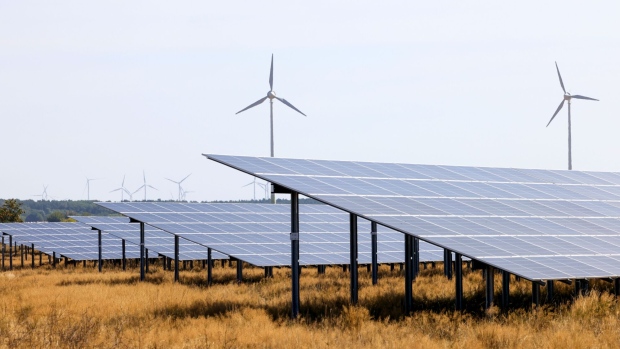Mar 15, 2024
Germany On Pace to Reach 2030 Climate Goals, Key Agency Says
, Bloomberg News

(Bloomberg) -- Germany is likely to reach its overall climate goals by 2030 even as it struggles to comply in the transport and building sectors, according to the Federal Environment Agency.
By the end of the decade, the country will be within reach of curbing greenhouse gas emissions by 65% from 1990 levels, the agency said in a report published Friday. Just a year ago, a reduction of 57% was expected.
The prediction is particularly surprising because the government says it can cut emissions even if the economy grows steadily.
“For the first time ever, the figures show that Germany is on track,” Economy Minister Robert Habeck said Friday in Berlin. However, he added: “We’re not doing equally well in all sectors – that’s why we have to make even more efforts in some areas.”
As Europe’s largest economy, Germany is at the center of the region’s transition to renewables and its recovery from a devastating energy crisis that saw industrial demand slump when prices soared to record levels. The nation — the region’s biggest laggard on reducing emissions — is also planning to phase out coal by 2030, eight years earlier than previously planned.
The report, which uses data through October, assumes economic growth of about 1.4% annually through next year, with a lower rate later in the decade. In contrast, the government now expects growth of 0.2% this year. Climate progress is often linked to economic slowdown, when industrial demand is muted.
Measures to accelerate the expansion of renewables — which now comprise more than half of the country’s power production — “are having an impact,” agency President Dirk Messner told reporters. He noted that industry is switching to gas from coal as energy prices have subsided, and that the agency is confident Germany can meet its coal phase-out goal.
‘Problem Child’
Switching off coal plants is an easier task than curbing emissions from buildings and vehicles, however. Last year, Habeck had to drastically water down a controversial ban on fossil-fuel boilers — aimed at slashing emissions in the housing sector — after months of public outcry.
The transport sector “remains a major problem child” for emissions, as Germany is set to wildly miss its goals for electric vehicles. The pro-business FDP, part of Chancellor Olaf Scholz’s three-party government, has torpedoed several initiatives aimed at reducing car traffic, from opposing a general speed limit to delaying an EU target to phase out combustion engines.
“The calculation that other sectors will compensate for the shortcomings in the problem areas of transport and buildings harbours considerable risks,” said Simon Müller, Germany director at Agora Energiewende. The think tank in January forecast that the nation would miss its 2030 climate target even as it slashes emissions.
One tool that could help achieve climate progress in both sectors is the European Union’s Emissions Trading System, according to the Environment Agency. By 2027 the ETS will cover heating and transport fuels, meaning that it will be more expensive for consumers to run gas boilers and drive older, more polluting vehicles.
“That’s why we need to ensure that this is socially cushioned,” Messner said.
©2024 Bloomberg L.P.






